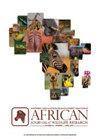纳米比亚东北部萨拉巴拉保护区的牛椋鸟宿主选择
IF 1
4区 环境科学与生态学
Q2 Agricultural and Biological Sciences
引用次数: 0
摘要
通过研究啄木鸟的寄主选择模式,研究其与不同寄主的生态作用和相互作用。这些信息对于制定有效的保护策略至关重要,这些策略将优先保护牛椋鸟及其宿主种群。该研究进行了实地观察,并记录了啄木鸟数量及其各自寄主物种的数据。此外,本研究还调查了纳米比亚东北部Salambala保护区寄主种类与寄主参数(体重和毛发长度)之间的关系。采用选择指数和密度指数计算一种牛椋鸟的宿主动物数量和宿主体表的牛椋鸟密度。以五边形为基础对牛椋鸟和有蹄类进行计数。在观察到的牛椋鸟中,75%是红嘴牛椋鸟,25%是黄嘴牛椋鸟。这些发现表明红嘴牛椋鸟(Buphagus erythrorhynchus)在宿主物种上比黄嘴牛椋鸟(Buphagus africanus)更常见。选择指数表明,红嘴牛椋鸟对黑斑羚(Aepyceros melampus)的偏好高于牛(Bos taurus),而黄嘴牛椋鸟对山羊(Capra aegagrus hircus)的偏好低于牛。黑斑羚和牛的选择指数在雨季均最高。在相关分析方面,选择指数和密度指数与寄主毛长和种典型体质量均无显著相关。本文章由计算机程序翻译,如有差异,请以英文原文为准。
Oxpecker Host-Selection in the Salambala Conservancy, Northeastern Namibia
By studying the host-selection patterns of oxpecker species, researchers can gain valuable insights into their ecological roles and interactions with different host species. This information is crucial for developing effective conservation strategies that prioritise the protection of oxpeckers and their host populations. The study conducted field observations and recorded data on the number of oxpeckers and their respective host species. Additionally, this study investigated the relationship between host species and host parameters (body mass and hair length) in the Salambala conservancy in northeastern Namibia. Selection and density indices were used to calculate the number of host animals supporting one oxpecker as well as the oxpecker density on a host's body surface. Pentad-based counts of oxpeckers and ungulates were conducted. Of the observed oxpeckers, 75% were Red-billed and 25% Yellow-billed Oxpeckers. These findings suggest that Red-billed Oxpeckers (Buphagus erythrorhynchus) are more commonly found on host species than Yellow-billed Oxpeckers (Buphagus africanus). The selection index indicates that Red-billed Oxpeckers have a higher preference for impala (Aepyceros melampus) compared to cattle (Bos taurus), while Yellow-billed Oxpeckers show a lower preference for goats (Capra aegagrus hircus) compared to cattle. The selection indices for impala and cattle for both oxpecker species were highest during the wet season. In terms of correlation analysis, there were no significant correlations between selection and density indices and host hair length or species-typical body mass.
求助全文
通过发布文献求助,成功后即可免费获取论文全文。
去求助
来源期刊

African Journal of Wildlife Research
Multiple-
自引率
0.00%
发文量
14
期刊介绍:
The African Journal of Wildlife Research is an ISI ranked, leading peer reviewed scientific publication in wildlife research in Africa, Arabia and Madagascar, with a broad base covering scientific, applied, managerial, methodological and sociological issues related to wildlife research. The journal publishes original full-length scientific papers, short communications, book reviews as well as reviews on science-based research invited by the editor-in-chief. This research journal and has been published annually since 1971.
Until 2014 (Volume 44) the journal was known as the South African Journal of Wildlife Research and from 2015 (volume 45) the name changed to African Journal of Wildlife Research. The journal reaches a wide readership, including both local and foreign wildlife managers, academics and wildlife owners, and libraries local and abroad. It is an important reference for anyone interested in the management and sustainable utilisation of natural resources.
 求助内容:
求助内容: 应助结果提醒方式:
应助结果提醒方式:


